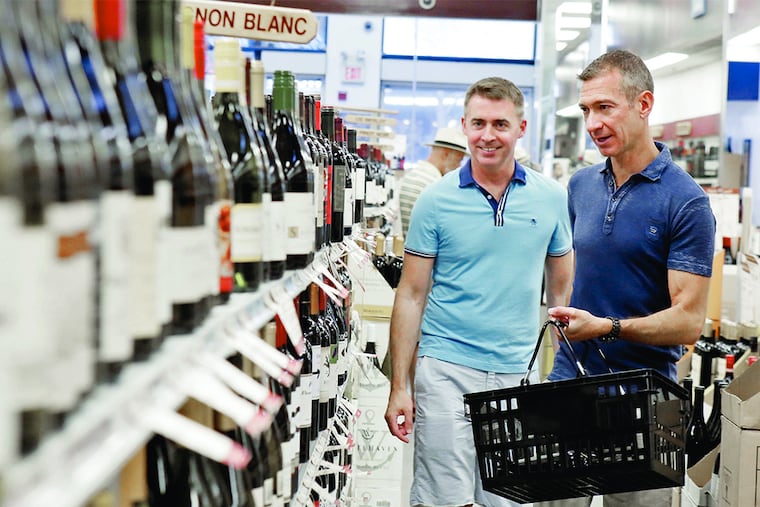Businesses are eager to cater to the LGBT community
Stephen Betts noticed the mailers and commercials aimed at the gay community becoming more frequent, especially in the last year.

Stephen Betts noticed the mailers and commercials aimed at the gay community becoming more frequent, especially in the last year.
"Definitely, I'm seeing more targeted advertising for gay and lesbian couples in bigger company ads," said the Center City resident, who works for a law firm. "It feels like they are going after different family types."
With good reason. In June, the U.S. Supreme Court recognized the legality of same-sex marriages. Gays and lesbians have evolved into a formidable financial bloc and are wielding their purchasing power with renewed gusto, experts say. Their spending clout is estimated at $884 billion.
A study released last month by Nielsen Holdings N.V., an American global information and measurement company, concluded that lesbian/gay/bisexual/and transgender households make 10 percent more shopping trips a year than non-LGBT households.
Last year, they spent, on average, $4,135 at retail stores - 7 percent more than non-LGBT households.
The consumer study was based on interviews with 1,397 respondents who self-identified as an LGBT household.
"There's been a resurgence among the gay community in using their money wisely," said Angela Giampolo, known as the Philly Gay Lawyer who serves the city's LGBT community. "We have political power to wield through our money. We like to recycle our money within our community. As a gay person, I want to support a gay business, a gay salon, a gay coffee shop."
Included among theNielsen report's other findings are:
LGBT consumers, on average, spend more at specialty retailers, which typically have higher prices and niche items. These include liquor, convenience, pet, electronics, and health-food stores.
They are less likely to spend money in dollar stores, department stores, stores on military bases, and toy stores.
LGBT households spend 48 percent more on wine than non-LGBT households, followed by 43 percent more on computer and electronic products, 35 percent more on liquor, and 32 percent more on men's toiletries.
LGBT consumers outspend non-LGBT consumers on music, with 23 percent more likely to spend on tickets for music festivals, 66 percent more on digital albums, and 55 percent more on CDs.
David Paisley, director of research at San Francisco-based Community Marketing & Insights, the largest LGBT research company in the United States, said gays and lesbians tend to gravitate toward safer communities and have higher education levels.
"What gives them purchasing power is the communities they live in," Paisley said. "We move to places where we are safe and accepted, like San Francisco and Center City Philadelphia, New York, or college towns or places like New Hope in Bucks County. Places where LGBTs and everyone else has better incomes."
Michael Sweeney, 48, who is senior counsel at Lyman & Ash in Center City, and his husband, Betts, 44, business manager at the same law firm, are the quintessential dual-income, highly educated, childless gay couple that marketers covet.
"We like to entertain," said Sweeney, as he and Betts recently bought $171.66 worth of wine, vodka, and whiskey at Fine Wine & Good Spirits at 1218 Chestnut St., in what's known as the city's Gayborhood. "We have a lot of dinner parties."
The couple married on April 22, their 20th anniversary together, on the back deck of their second home, in New Hope. Their primary residence is a three-story house in Center City.
"Absolutely, you feel comfortable walking into a store that likes you and welcomes your business," Betts said as he and Sweeney stopped later that day at Everything Fresh, a local grocer, to pick up dinner.
The couple often shop within the Gayborhood, and from major companies supportive of the LGBT community.
"We support all the businesses around here," said Sweeney, who specializes in constitutional and employment law and civil litigation. "We're friends with many of the owners."
Todd Evans, chief executive officer of Rivendell Media Co. in Mountainside, N.J., the nation's leading LGBT media placement firm, said: "It's all about dollars. But while companies may also want to support equal rights, the best ones know how to leverage both."
Philadelphia lawyer Giampolo, 35, saidan LGBT personnationally earns more than $61,000, on average.
"They are less likely to be unemployed and [are] more educated," she said, excluding the average transgender person, who is more likely to make less money even when having further education. "And because they have never been able to get married until very recently outside societal norms, they have less debt and are more financially stable. They don't have children as often, but when they do, there's a lot of planning and money" involved.
Paisley in San Francisco said it's not surprising that the Nielsen study found that gays and lesbians spend more on travel and alcohol. Both sectors have catered to the group for years, he said.
Back in the 1990s, beverage companies, particularly beer producers, reached out to them. In the last decade, vodka makers have done the same. W Hotels and Kimpton were the first in the hotel sector to cater to gay men and lesbians a decade ago.